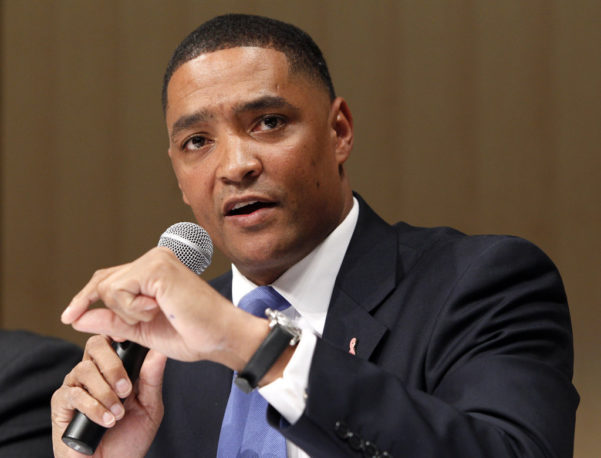
March 22, 2017; Washington Post
“Black people have no permanent friends, no permanent enemies…just permanent interests.” This quote by Congressman William L. Clay, Sr. announced the no-nonsense stance of the Congressional Black Caucus in a document they left with the president yesterday.
The president finally met with the six-member executive committee of the Congressional Black Caucus yesterday, but there were no photo ops in it for Trump. Present at the event were Rep. Cedric L. Richmond (D-LA), the CBC’s chairman, along with Reps. Karen Bass (D-CA), James E. Clyburn (D-SC), Gwen Moore (D-WI), Brenda Lawrence (D-MI), André Carson (D-IN) and Anthony G. Brown (D-MD). All purposefully sat safely out of camera range as he intoned, “They’ve lifted up the conscience of our nation in the march toward civil rights, enriched the soul of America in their faith and courage, and they’ve advanced our country in the fields of science, arts and medicine.”
Readers may remember the heads of the nation’s historically black colleges and universities did stand behind a grinning Trump at their meeting a month ago. The event became an object lesson of sorts. “The Congressional Black Caucus is not going to be a potted plant or a photo opportunity,” said Rep. Donald A. McEachin, a Democrat from Virginia and a CBC member. “He did a photo op with the presidents of historically black colleges, and they got nothing.”
The CBC committee brought with them a policy memo titled “We Have a Lot to Lose: Solutions to Advance Black Families in the 21st Century,” which was delivered to the president during the meeting. “We honor this opportunity to enlighten President Trump on the history and diversity of African Americans and offer bold policy solutions to advance our communities, and all Americans, in the 21st century,” reads the document. “If President Trump is sincere in his interest in advancing the Black community, this document should be the guiding post of his Administration.”
The committee also delivered to the president letters written by other CBC members and addressed to various members of his cabinet. Mother Jones reports:
In a letter to Attorney General Jeff Sessions, Richmond and Rep. John Conyers (D-MI) write that “the first several weeks under your tenure have given us many causes for concern.” The congressmen note that they are particularly worried about the fate of criminal justice reform, racial profiling, voting rights, and policing under a Sessions’ Justice Department. In January, Richmond and other members of the CBC testified against Sessions’ nomination for attorney general, citing his history on racial controversies.
Sign up for our free newsletters
Subscribe to NPQ's newsletters to have our top stories delivered directly to your inbox.
By signing up, you agree to our privacy policy and terms of use, and to receive messages from NPQ and our partners.
In a letter to Education Secretary Betsy DeVos, Richmond and Rep. Bobby Scott (D-VA) cite their concerns with the administration’s focus on school choice vouchers, arguing that diverting funds to private schools will further endanger public schools and leave “the most disadvantaged students with the fewest resources.” The letter also notes that despite a highly publicized meeting between the Trump administration and the leaders of historically black colleges and universities, the president’s proposed budget offers little insight into how it will address educational institutions specifically aimed at helping minorities.
“We never thought we’d agree on everything in this meeting, but the one thing we did ask is for both sides to be candid,” said Richmond. “He listened, and we talked, and we proposed a lot of solutions, many of which I think he had not heard before, and we’re going to keep advocating.”
That the Caucus gave him that much was an act of grace. Readers may remember that during a brutally long and tempestuous press conference, April Ryan, a black reporter with the American Urban Radio Networks, asked Trump when he might meet with the caucus. “Are they friends of yours?” Trump asked, suggesting that maybe she would go ahead and set one up for him. Was he being provocative or ignorant or both?
Other examples of his racial attitudes have followed. The Washington Post reports:
At an event he held to mark the outset of Black History Month, Trump rambled about his 80-point defeat among black voters, hypothesized about what could get him to a majority of the black vote in 2020, and mentioned the abolitionist Frederick Douglass as “an example of somebody who’s done an amazing job and is being recognized more and more.” Douglass died in 1895.
In an optimistic act of faith, the policy memo ends with a remarkable reading list on all of the major issues to which they want to draw Trump’s attention—including environmental justice, education, workforce, economic justice, criminal justice, and voting rights, among other things—and where they need for him to shift his frame. The list is, by the way, chock-full of publications from nonprofits and an excellent reading list on race and policy for our readers as well.
In the end, press secretary Sean Spicer did tweet a photo of CBC members and Trump sitting in the same space, but that will be unlikely to earn any points from black voters, many of whom will by now know this story for what it is.
Brenda Lawrence summed up the intention of the meeting in realistic terms: “Our objective is to walk away having given the president an opportunity to hear, to be enlightened, and to start a dialogue for the next four years—if he stays in office.”—Ruth McCambridge












